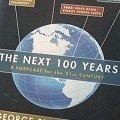Intelligence Analyst Looks at Conflicts and Progress in Next 100 Years
One of the major issues discussed around the world these days is the challenge of feeding a growing population.
But, in the decades ahead, George Friedman believes this concern will be swept aside by the challenge of declining birth rates coupled with the aging of the largest segment of the current population.
"On the one hand, everybody still talks about the population explosion; on the other hand everybody knows about the graying of society," Friedman said. "Beyond the graying of society is the death of the gray hairs and the fact that many countries like Germany and Russia are going to have populations 25, 30 percent smaller." Friedman says industrialized nations with declining populations will need more immigrants from less developed nations to do their work.
"As you have a labor shortage, somebody is going to have to come in to these advanced industrial countries, first of all, to do the labor that no one else is available to do. So we are going to be competing for immigrants," Friedman said. Not so fast, say those who advocate programs to reduce population growth.
One who expresses some doubts about Friedman's forecast is Elizabeth Leahy Madsen, Research Associate with Population Action International. "Projections of future population produced by the United Nations assume that all countries' fertility rates are going to converge at a universal, fairly low level," Madsen said. "However, current trends in countries in both developed and developing regions don't indicate that that convergence is already under way." In other words, she maintains, the reduction in population Friedman sees will not come about without major efforts to promote birth control.
But George Friedman does not argue against such policies. He simply says he thinks the problem will be solved in the century ahead.
And when it comes to climate change, a very real problem, in his opinion, he sees a clean energy future provided by giant solar arrays in near-earth orbit.
"In space you have plenty of room to put solar collectors and your only problem is beaming it back to earth and there are two ways to do that, one is by cable and the other is by microwave radiation," Friedman said. Friedman says such an idea may sound outlandish now, but he notes that many of the ideas that emerged from science fiction 100 years ago, such as worldwide air travel, satellites and telecommunications are commonplace today.
Friedman's book also contains a number of startling political predictions. He says Poland and Turkey will emerge as major powers and that by the end of this century Mexico will challenge the United States for dominance in North America.
"This is a great power. It is next door, it has 100 million people and it has a problem with the United States and the United States has a problem with it," Friedman said. "It is very difficult to imagine an evolution in which Mexico drops back in the pack or one in which is very strengths do not challenge the United States." He says U.S. irritation over illegal immigration and drug smuggling and Mexican resentment of U.S. dominance will eventually grow stronger, even though the two countries have strong trade relations.
Friedman predicts the United States will face some serious challenges in the next decade or two, but no emerging power, not even an economic powerhouse like China, will displace the United States.
"When you take a look at the fundamentals, it is impossible to imagine another country surpassing the United States in the time frame of this century," Friedman said. By mid-century, Friedman says there is likely to be a world war involving weapons based in space and that Japan may launch a surprise attack on orbiting U.S. battle platforms from bases on the moon, in a sort of "Star Wars" version of the Japanese attack on the U.S. fleet at Pearl Harbor in 1941.
George Friedman is the first to admit he has no crystal ball and that he could be wrong on how events will unfold, but he says final judgment on his forecasts can only come from those who will be alive 100 years from now.
Greg Flakus, VOA News, Austin, Texas

